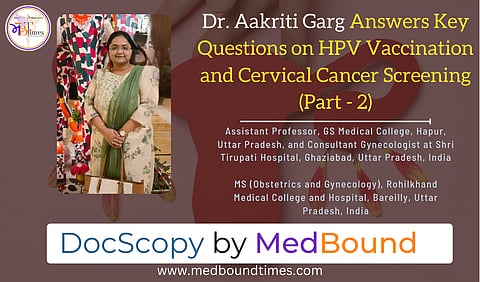Dr. Aakriti Garg Answers Key Questions on HPV Vaccination and Cervical Cancer Screening (Part - 2)
Welcome back to Part 2!
Dr. Aakriti Garg is an MBBS, MS OB-GYN (Obstetrics and Gynecology), a Laparoscopic Surgeon, and an Aesthetic and Cosmetic Gynecologist. She did her MBBS from Netaji Subhash Chandrabose Subharti Medical College, Meerut from 2012 to 2017. She did her MS OB-GYN from Rohilkhand Medical College, Bareilly from 2020 to 2023. Then she did a senior residency of one year from 2023-2024. Currently, she is an Assistant Professor at GS Medical College, Hapur and she is doing private practice at Shri Tirupati Hospital, Kavi Nagar, Ghaziabad, U.P. She has a total work experience of 5 years.
In this Part 2 interview with Dr. Anam Khan of MedBound Times, Dr. Aakriti shares her insights on the prevention and treatment of Cervical Cancer and the importance of HPV Vaccination.
Dr. Anam Khan: How often should women get screened for cervical cancer, and what tests are recommended?
Dr. Aakriti Garg: Cervical cancer screening through Pap smears and HPV tests is crucial for early detection and prevention. These tests identify abnormal cells before they become cancerous, improving outcomes and survival rates. Women of aged 21-65 years of age should get themselves screened every 3 years. Tests recommended are pap smear and HPV testing. Others are liquid-based cytology or visual inspection with acetic acid.
Dr. Anam Khan: Can HPV testing replace the need for a Pap smear, or are both necessary?
Dr. Aakriti Garg: Both are necessary, termed by co-testing. It combines HPV testing and cytology (Pap smear) for cervical cancer screening, enhancing accuracy and reliability. It offers nearly 100% sensitivity while maintaining cytology's specificity. Recommended for women aged 30-65, co-testing has a high negative predictive value, providing strong reassurance when both tests are negative.
Dr. Anam Khan: What should a patient do if their Pap smear results show abnormalities?
Dr. Aakriti Garg: In case of an abnormal pap smear report, which could be ASCUS- ASC-H, LSIL, or HSIL, one should go for a colposcopy-directed biopsy to study the cervix in detail and to rule out any possible micro invasion or malignancy.
Dr. Anam Khan: Are there specific lifestyle changes that can help reduce the risk of HPV infection and cervical cancer?
Dr. Aakriti Garg: To reduce your risk of cervical cancer, focus on getting vaccinated against HPV, practicing safe sex, quitting smoking and tobacco and getting regular screenings.
Dr. Anam Khan: What are the current treatment options for cervical cancer at different stages?
Dr. Aakriti Garg: For treating cervical cancer, surgical options are radical hysterectomy and modified radical hysterectomy with pelvic lymph node dissection depending upon the involvement. Also, there is chemotherapy, radiotherapy, neoadjuvant therapy, and concurrent chemoradiation. Treatment is highly extensive, which might involve exenteration of the bladder also. Treatment modality changes according to the increasing severity of the disease.
Dr. Anam Khan: How important is early detection in improving the survival rate of cervical cancer patients?
Dr. Aakriti Garg: India accounts for approximately one-sixth of the global burden of cervical cancer and one-fifth of the global deaths from the disease. Cervical cancer is the second most common cancer among women aged 15 to 44 years in the country. India reported approximately 123,907 new cases of cervical cancer, with around 77,348 deaths attributed to the disease. Early detection of the disease would reduce the global burden of the disease and facilitate an improved survival rate.
Dr. Anam Khan: What advancements in research or treatment options give hope for better prevention or cure?
Dr. Aakriti Garg: We have a highly effective vaccine, Gardasil-9, which covers 9 variants of the strain and protects against HPV infections. As far as treatment is concerned, there has been great advancement in chemotherapeutic agents as well as radiotherapy. We have options for image-based and targeted therapy to minimize the side effects. This even facilitates to saving or preserving ovarian tissue in the case of young patients' ordeal to have a fertility-preserving option for them.
Dr. Anam Khan: What advice would you give to women who may feel hesitant about HPV vaccination or cervical screening?
Dr. Aakriti Garg: I would just like to let everybody reading this article know that HPV vaccination or cervical cancer screening is very important for every female as it is just not a personal choice, but it is for the community. Every female's contribution helps in providing herd immunity, which can help reduce the global burden of the disease and eventually eliminate HPV infections.
MedBound Times expresses sincere gratitude to Dr. Aakriti Garg for sharing her valuable insights on our platform.


